|
|
|
Sort Order |
|
|
|
Items / Page
|
|
|
|
|
|
|
| Srl | Item |
| 1 |
ID:
116858
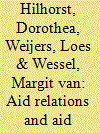

|
|
|
|
|
| Publication |
2012.
|
| Summary/Abstract |
This paper considers mutual imaging of aid workers and Bhutanese refugees in Nepal. Based on a theoretical perspective of aid as a socially negotiated arena, the contextual and interactionist concept of imaging is used, rather than labelling (which is done to people), or perceptions (located in one actor's head). The paper uses a Q-methodology that symmetrically researches different groups of actors by posing the same questions. Our data confirm that the distinctions between the way aid workers and recipients view themselves, each other and the aid provided were more gradual than clear-cut between categories and that the legitimacy of aid workers is not determined by the perceived quality of aid. Problems with routinised aid were not translated into negative images, whereas problems with new and irregular types of aid were. Our research indicates the importance of the interaction between implementing staff and active beneficiaries. The roles of these active volunteers and incentive workers are important but ambiguous. They may smooth the divide between aid agencies and clients, but their proximity to the aid regime may also lead to tensions. The way these roles are played out and the effect this has on imaging and aid legitimacy is an area for further research.
|
|
|
|
|
|
|
|
|
|
|
|
|
|
|
|
| 2 |
ID:
116857


|
|
|
|
|
| Publication |
2012.
|
| Summary/Abstract |
This paper explores some of the cross-cultural friendships of Western NGO workers with Indonesians, before and after the 2006 earthquake in Yogyakarta. These kinds of friendships enabled aid workers to transcend a private-professional divide which is often taken for granted. The paper draws attention to different cultural ideals of friendship and argues that cross-cultural friendships present a central instrument for establishing emotional belonging and for crafting identities. The social competences gained frequently moved beyond the individual private sphere and were turned into meaningful resources and professional qualifications relevant in development work. I argue that friendships act as mediators allowing aid workers to oscillate between different spheres of social engagement. This intermediate potential renders friendships highly relevant to more in-depth anthropological enquiry into development workers' everyday lives and their cultural positioning in foreign environments.
|
|
|
|
|
|
|
|
|
|
|
|
|
|
|
|
| 3 |
ID:
116864
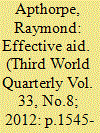

|
|
|
|
|
| Publication |
2012.
|
| Summary/Abstract |
International aid workers are invisible in the absence of data as to who cleaves to what knowledges and practices about how aid works to be effective. When it is similar or different best practice positions that are taken is another unknown, despite what this could tell us about aid effectiveness. This paper identifies through their everyday poetics two of the angles on 'how aid works' that aid workers take. One angle displays a programmatic, or 'like clockwork' aesthetic about how aid is said to 'work' through causal mechanisms, provided only that the right policy and 'the tools we have' are put in place and implemented. The other, a 'like an artwork' aesthetic, puts constitutive institutions and new interpretative understandings to the fore. The aid effectiveness issues and reforms associated with the 2005 Paris Declaration on Aid Effectiveness and subsequent meetings, the latest in Busan in 2011, do not address many, if any, of the issues raised in this paper. They should.
|
|
|
|
|
|
|
|
|
|
|
|
|
|
|
|
| 4 |
ID:
116856
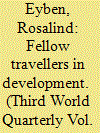

|
|
|
|
|
| Publication |
2012.
|
| Summary/Abstract |
Although what has been called 'the people-centred development decade' of international aid in the 1990s can be explained at the systemic level by the end of the Cold War, such an account does not tell us how it actually came about. This article argues that a contributory factor can be identified through the life-histories of a generation of development semi- professionals, women now in their sixties who were caught up and part of two great emancipatory moments in the second half of the 20 century: freedom from colonialism and women's liberation. These shaped their consciousness and produced political effects that gave them the opportunity to influence development practice. That they were able to make use of that opportunity is attributed to their versatility and entrepreneurship, developed through a force of circumstance that had given them an education but denied them the traditional career path taken by their male peers.
|
|
|
|
|
|
|
|
|
|
|
|
|
|
|
|
| 5 |
ID:
116862
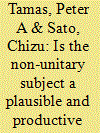

|
|
|
|
|
| Publication |
2012.
|
| Summary/Abstract |
Development bureaucrats are the human instruments of the policies that mobilise funds, create organisations and underwrite interventions. For their home audiences development organisations need to present bureaucrats who are reliable instruments. In the field these same organisations need staff who can do what makes sense. This arrangement works until what makes sense in head office does not work in the field. At that point staff have to 'marry off' these two worlds. How these staff are understood shapes both how they can be approached by locals and how they should be supported by their organisations. This paper draws on research done in a donor organisation headquarters, in a military unit tasked with conducting development activities and at a field-level donor mission in a failed state. It explores the relevance, methods to research, the plausibility and the productivity of understanding the development bureaucrats who do this 'marrying off' as non-unitary subjects.
|
|
|
|
|
|
|
|
|
|
|
|
|
|
|
|
| 6 |
ID:
116860
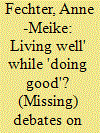

|
|
|
|
|
| Publication |
2012.
|
| Summary/Abstract |
This paper takes at its starting point public criticism of international aid workers who appear to be 'doing well out of poverty'. Based on fieldwork in Cambodia, the paper suggests that such public perceptions are mirrored by some aid workers' uncertainties about the moral dimensions of their own and others' lifestyles. Significantly, analyses of such public and private unease are largely absent from development ethics, even though comparable professions, such as nursing or social work, having produced substantial work on these issues. I argue that the scarcity of equivalent studies in development studies is partly the result of a tendency to foreground the 'other'-the world's poor-while rendering those who deliver aid invisible. Placing 'aid recipients' and 'aid givers' in separate categories, together with an emphasis on collective rather than individual moral responsibilities, not only makes it difficult to conduct open debates on the role of altruism and professionalism among aid workers, but also indicates how practices of 'othering' continue to inform aspects of development theory and practice.
|
|
|
|
|
|
|
|
|
|
|
|
|
|
|
|
| 7 |
ID:
116863


|
|
|
|
|
| Publication |
2012.
|
| Summary/Abstract |
This article considers the implications of the varied social meanings and values practitioners give to aid and the logics they use to make sense of Aidland's inequitable economy. The author draws on experience as an aid practitioner, as well as on ethnographic research in Cambodia to propose that dominant economic approaches to assessing the value for money delivered by aid risk overlooking the values and varied interpretive logics aid workers use to make sense of aid allocations and exchanges. The article highlights dilemmas experienced by aid workers living and working in an inequitable socioeconomic system produced by aid flows that constantly have to be negotiated, reconciled or ignored. A case study from Cambodia shows how the interpretive lenses aid workers use to evaluate the use of aid money influence their relationships and practice in ways that have material effects. This suggests they deserve further study, likely to be aided by reference to ideas from economic sociology and anthropology.
|
|
|
|
|
|
|
|
|
|
|
|
|
|
|
|
| 8 |
ID:
116859


|
|
|
|
|
| Publication |
2012.
|
| Summary/Abstract |
This article explores the role that skills and knowledge play in the relationships between national and international volunteers and staff. Based on biographical interviews with people working for a wide range of aid organisations, the experiences and strategies of individuals and organisations dealing with inequality and diversity are explored. In particular, the paper addresses the question of whether professionalisation processes that can currently be observed in the field of humanitarian aid might contribute to minimising or perpetuating the gap between national and international aid personnel. Professionalisation processes can have positive effects not only for aid recipients, who obtain better services, and for the careers of aid personnel, but also for donors and hiring aid organisations, which benefit from a skilled workforce. However, we need to critically reflect on what kind of knowledge is validated, where it can be obtained and whether credentials guarantee hiring and promotion of qualified staff from all regions.
|
|
|
|
|
|
|
|
|
|
|
|
|
|
|
|
| 9 |
ID:
116861


|
|
|
|
|
| Publication |
2012.
|
| Summary/Abstract |
This article focuses on young adults from Germany who accomplish one year of voluntary service in various social projects in Uganda. The participants are between 18 and 28 years of age and most of them stay abroad for about 12 months. The study investigates conceptual approaches of experiences and asks for transnational experiences or experiences made in the context of transnationalism. Spaces, in which differences and conflicts can be bridged and negotiated, are meetings amongst the volunteers themselves as well as amongst volunteers and Ugandans, who then become 'cultural agents'. The community therewith offers a save space of exchange, in which the volunteers do not feel obliged to constantly reflect on their actions, practices and behaviour. In sum, the empirical material shows the different reasons for the young adults to accomplish a year of voluntary service in Uganda. Challenges the volunteers face during their stay can be shown additionally. Doing this, I am developing the concept of 'inconsistency of status' from the empirical material and also highlight the ways in which the volunteers are dealing with their 'situations of ambivalence'. Last but not least this ambivalences will be discussed as 'In-betweenness' and this 'In-betweenness' as an opportunity.
|
|
|
|
|
|
|
|
|
|
|
|
|
|
|
|
|
|
|
|
|